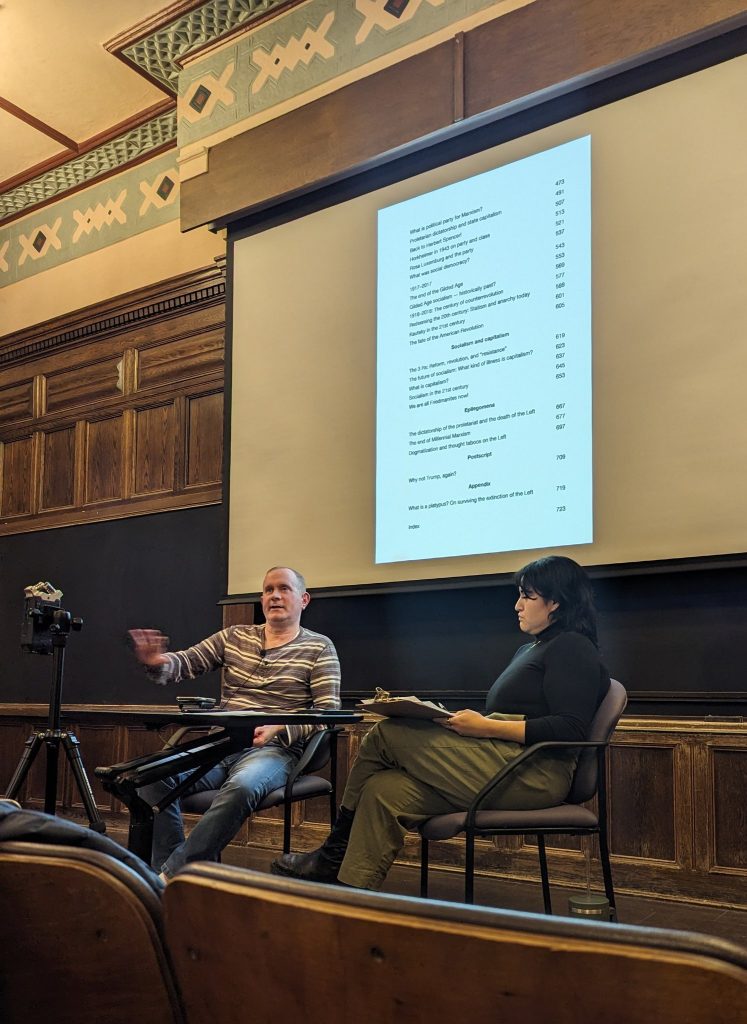Chris Cutrone discusses the origins of Marxism in the Revolutions of 1848 with Maurin Academy,
Chris Cutrone with Todd McGowan on Marx, Hegel, Adorno, Freud and Lacan
Chris Cutrone debates Todd McGowan on Hegelian dialectics and Freudian theory through Marx, Lenin, Adorno and Lacan.
Chris Cutrone with Nicholas Kiersey on The Death of the Millennial Left and Marxism and Politics
(Video starts at 7:29:00)
Chris Cutrone discussed his books The Death of the Millennial Left and Marxism and Politics with Nicholas Kiersey in the Department of Political Science at the University of Texas, Rio Grande Valley.
Chris Cutrone with Laurie Johnson on 1848 Revolutions and Marxism
Chris Cutrone discusses the historical significance of the Revolutions of 1848 and Marxism with Laurie Johnson of Dustbowl Diatribes and Maurin Academy.
Chris Cutrone with Doug Lain and Ashley Frawley on defending the Frankfurt School
Chris Cutrone joins Ashley Frawley and Douglas Lain to respond to Midwestern Marx’s Carlos Garrido and other Leftist criticisms of the Frankfurt School.
Chris Cutrone with Doug Lain on Trump, Friedman and post-neoliberalism
Chris Cutrone discusses the third essay in his “Why Not Trump?” series in the context of a U.S. election wherein all sides are abandoning the constitutional order. Lawfare, the power of the executive, impeachments, and a many other topics are discussed in this episode of the CutroneZone. Chris Cutrone and Douglas Lain discuss Milton Friedman and more in the Parrot Room.
Book talk on Marxism and Politics at University of Chicago

On April, 4th 2024 as a part of its 2024 International Convention, the Platypus Affiliated Society hosted a book talk from Chris Cutrone for his upcoming book Marxism and Politics: Essays on Critical Theory and the Party 2006–2024 at the University of Chicago. Preview available at:
https://www.academia.edu/118222480/Marxism_and_Politics_Essays_on_Critical_Theory_and_the_Party_2006_2024_extract
Chris Cutrone is the last Marxist. He teaches Critical Theory at the School of the Art Institute of Chicago and the Institute for Clinical Social Work and completed his PhD on Adorno’s Marxism at the University of Chicago, where he taught for many years in the Social Sciences Core Curriculum, and is the original lead organizer and chief pedagogue of the Platypus Affiliated Society. He is the author of Marxism in the Age of Trump (2018), The Death of the Millennial Left: Interventions 2006–2022 (2023) and Marxism and Politics: Essays on Critical Theory and the Party 2006–2024 (2024).
Chris Cutrone with Doug Lain on Finkelstein Vs. Destiny debate on Israel-Palestine
Chris Cutrone discusses the Norman Finkelstein vs. Destiny debate on the Lex Fridman show. How did the framing of this debate accept the very conditions that need to be overcome as immutable and permanent. How might socialists work to overcome these conditions? Chris Cutrone continues to discuss the Finkelstein debate, but we move on to discuss Frederic Jameson, the meaning of Academic Marxism, and what it is to be “pre-canceled” on the Left as a Marxist.
Chris Cutrone with Doug Lain on the American Revolution and Trump
The Last Marxist Chris Cutrone discusses the meaning of the American Revolution, Trump remaining on the ballot, the branches of government, and the meaning of socialism.
Chris Cutrone with Doug Lain on imperialism and the “Left”
Chris Cutrone returns for another CutroneZone, this time to explain what it means to live through “imperialism as the highest stage of capitalism.”